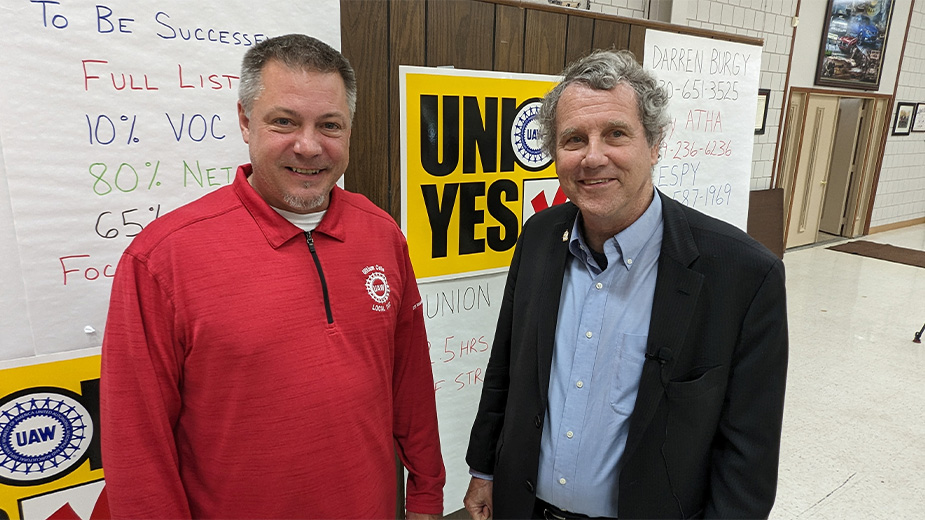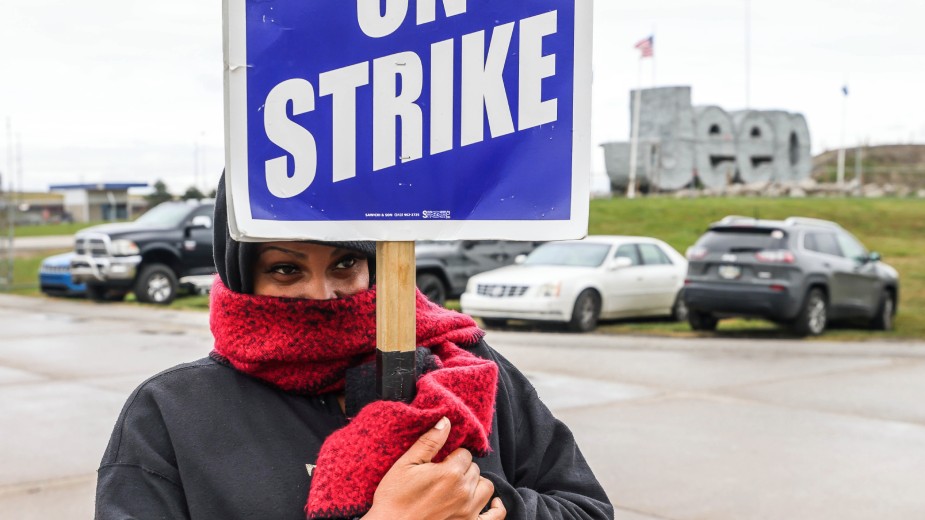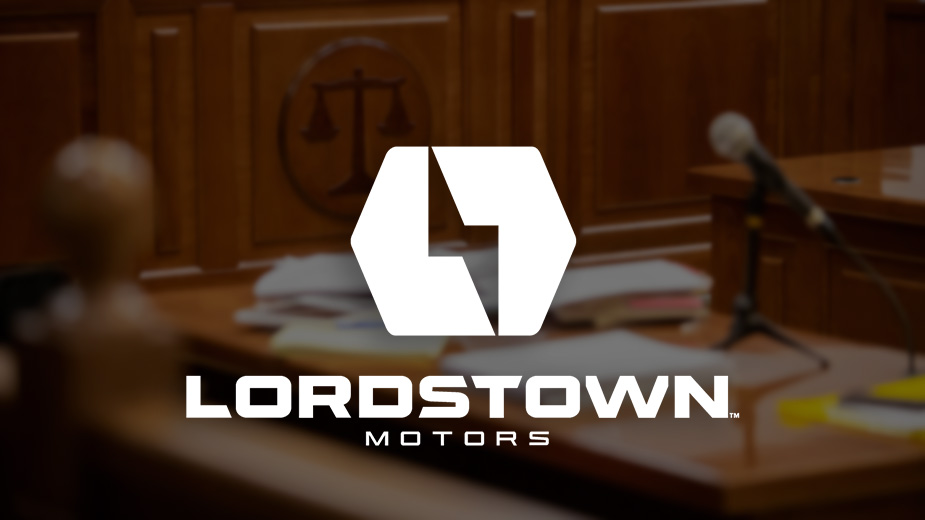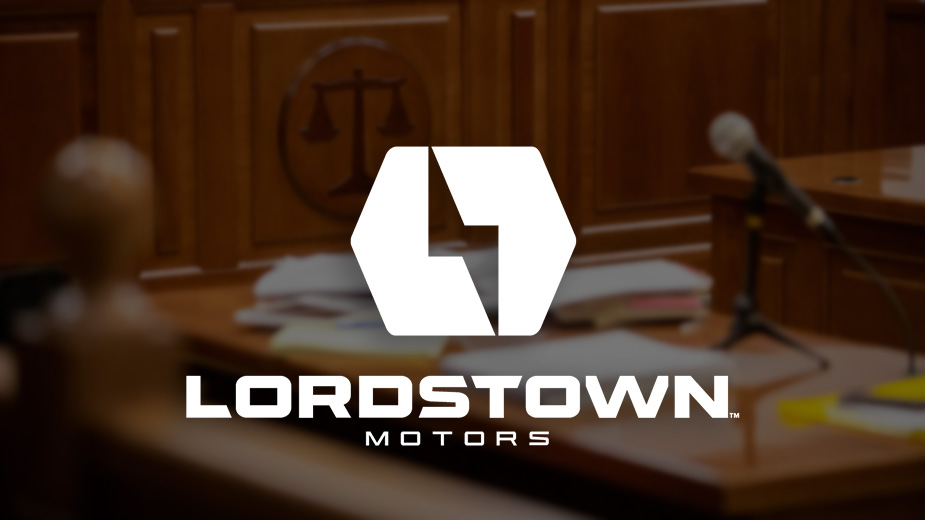Brown Discusses Wages, Safety with Ultium Workers and UAW
LORDSTOWN, Ohio – The former president of United Auto Workers Local 1112 says it might be some time before an agreement is reached between General Motors’ joint venture – Ultium Cells LLC – and the union.
“It takes a while,” David Green, now the director of UAW Region 2B, said at a press event at Local 1112’s union hall Monday. “Over 400 days is the average length of time to get a first contract. First contracts are always the hardest.”
UAW and Ultium – a joint venture between GM and Korea-based LG Energy Solution – have been in collective bargaining talks since January. In December, workers at the plant overwhelmingly voted to join the UAW after an election at the plant and are represented by Local 1112.
On Sunday, hourly workers at Ultium resoundingly approved an interim agreement that boosts wages on average by 25% at Ultium-Ohio. The pay increases began Monday and are retroactive from December, according to the agreement.
“I think today is really a great day for the UAW 1112 members at Ultium,” Green said. “Our members are going to receive well-deserved financial relief from the poverty wages they were making.”
U.S. Sen. Sherrod Brown, D-Ohio, joined Green and other UAW members at the hall to discuss the new agreement and other matters of concern from Ultium’s workforce.
Both the company and the UAW have said that the breakthrough agreement is a first step toward reaching a full collective bargaining agreement.
“I think we’re going to continue to work real hard at the bargaining table and hopefully get a full contract for these workers so they can thrive,” Green said.
Green said the UAW is lobbying for a single national master contract with GM that covers workers at its joint venture battery plants, including Ultium.
The UAW is in contract talks with GM, Ford and Stellantis on a national collective bargaining agreement. Ultium and other joint ventures of the Big 3 should honor those contracts, Green said.
A UAW autoworker earns, on average, $32 per hour, Green said. Ultium workers should make the same, he said.
Brown praised the efforts of bargainers to reach an agreement that raises pay, but he said there’s more work to be done.
“We’re now getting closer to the pay that they’ve earned,” Brown said during a press event after a private roundtable discussion with workers.
However, the raises are on top of what he referred to as “insulting” wages of the approximately $16.50 starting pay that hourly workers previously earned.
“We are laying down a marker: The auto jobs of the future must be union jobs,” Brown declared. “Ultium needs to agree to a fair contract that honors the dignity of work and recognizes that workers drive the auto industry’s success. The cars of the future will be made in Ohio, by union workers, and we’re not going to settle for anything less.”
Ultium Cells spokeswoman Katie Burdette said in a statement that the company was not invited to participate in the roundtable or press event.
“This is the right action to take for our team members and is the result of constructive and meaningful dialogue with our local union leadership,” Burdette said in a statement released after the vote approving the interim agreement Sunday.
“This is just a first step to reward our team for their hard work and dedication to ensuring Ultium Cells’ success in leading a transformation of American transportation,” the statement said. “We continue to bargain in good faith with the UAW and are committed to reaching an agreement on a comprehensive contract for our employees, including a final wage scale.”
Brown said it is important that teams arrive at a contract that contains good wages and benefits for workers, as well as safety measures.
“The country will be watching,” he said. “This is the first time that a joint venture like that has agreed to a raise of up to $7,000 in back pay.”
Still, he thinks that these companies must do better and continue boosting wages while ensuring the safety of workers at the plant. “GM has got to step up; their Korean partners have to step up.”
Brown has also been vocal about the Big Three automakers agreeing to fold their battery joint ventures into a national UAW agreement.
“A fair wage is a national UAW contract,” Brown said. “GM can’t hide behind the fact that it owns half of this company. They need to honor the national contract.”
Ultium has said it’s a separate company from GM and it is unlikely that it could be included in any national bargaining agreement GM strikes with the UAW.
Safety is another issue that Ultium needs to address, Brown said. “These employees are handling chemicals they’ve never handled before,” he said.
The science behind these materials is so new that it has outpaced federal safety regulations, Brown added.
Ethan Surgenavic, who works in the skilled trades, said there are safety issues throughout the plant. “I cover the entire plant, so I see all the chemicals firsthand,” he said. He added there are no clear instructions on how to handle these chemicals safely, noting it’s a “major, major concern.”
Ultium reported on Aug. 21 that a chemical leak had temporarily shut down production. The company responded that it took swift action to contain the spill and that no one was in the area. The problem has since been fixed, and production at Ultium has resumed.
Trish Brown, who started working in production maintenance at the plant in July, said communication is another issue within the plant.
“We don’t have clear lines of communication between our OEMs and our supervisors,” she said.
Ultium said it continues to make improvements at the plant.
“Ultium Cells is focused on continuously improving our site,” Ultium spokeswoman Burdette said in a statement released Tuesday. “Safety is a top priority each day and we are building a culture of engagement with our team members. Ultium has partnered with UAW appointed four union safety representatives to work collaboratively and transparently to drive engagement and continuous improvements in safety across the site.”
The UAW’s Green headed two local unions representing thousands of hourly workers at GM’s former Lordstown manufacturing complex nearby. He noted that he’s not surprised that workers at Ultium have serious concerns over safety conditions and future wages.
“I went through the bankruptcy in a leadership position,” Green said, recalling GM’s Chapter 11 reorganization in 2009. During that period, Green said that the UAW made concessions to bring GM back to profitability.
“The fact is, the culture changed after the bankruptcy, and has really never restored since then,” he said. “Corporate profits, corporate greed – they’re more worried about the bottom line.”
Green began working at GM’s Lordstown plant in 1989. He served as president of Local 1714 from 2007 to 2013, and was elected president of Local 1112 in May 2018. Six months after he was elected to that position, GM announced it would close the Lordstown plant, eliminating the approximately 1,300 jobs that remained.
“The struggle is real,” Green said. “The fight’s not going to be over until these workers are brought up to traditional autoworker standards.”
Pictured at top: David Green, left, former president of United Auto Workers Local 1112 and now director of UAW Region 2B, and U.S. Sen. Sherrod Brown.
Copyright 2023 The Business Journal, Youngstown, Ohio.



